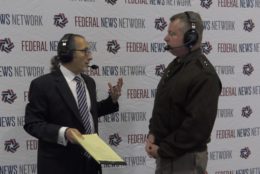Defense
-
In today's Federal Newscast: The undersecretary of the Air Force said the failure to pass all 12 regular appropriations will have catastrophic effects on the DoD. Feds, who relocate for work, may soon have better coverage of their moving expenses. And National Institutes of Health's governmentwide acquisition contract, adds to its record-breaking number of bid protests.
January 25, 2024 -
DoD will update its policy for coverage of infertility treatments, giving access to active-duty members who are either unmarried or in same-sex marriages.
January 24, 2024 -
DoD’s new guidance clarifies what FedRAMP equivalency means and requires cloud service providers handling controlled unclassified information to get a letter of attestation from a third-party organization that says they meet the FedRAMP Moderate baseline standards without plans of action and milestones.
January 23, 2024 -
Sort of lost in all the other activity in the last few months, is a Biden administration proposal to create a new Office of Management and Budget circular. The circular describes a centralized data management strategy to help agencies with acquisition decision-making.
January 23, 2024 -
TMF has a new acting leader, a long-time Senate staffer heads to the White House cyber office, and three federal acquisition and IT leaders head out the door.
January 23, 2024 -
In today's Federal Newscast: The SEC has figured out how its official X account was hacked. The Technology Modernization Fund program management office has new temporary leadership. And the U.S. Navy gives birth to a new pregnancy policy.
January 23, 2024 -
An organization that supports active duty service members has launched an initiative to make it easier when changing duty stations. The Military Family Advisory Network has partnered with some large retailers to give families a little something when they arrive at the new location.
January 22, 2024 -
During this webinar, you will gain the unique perspective of top government security experts.
January 21, 2024 -
Armies in other parts of the world have called on the U.S. Army, and other armed forces, for platforms and ordnance. This as the U.S. military ponders its own supplies, readiness, and the overriding question of the capacity and resilience of the defense industrial supply base.
January 19, 2024 -
Yvette Bourcicot, the principal deputy assistant secretary of the Army for Manpower and Reserve Affairs, said with 500 occupations separated into 11 career fields, the service is reimagining how it attracts, retains and develops civilian employees.
January 19, 2024 -
DoD’s space office is “assigning minimum classifications to a various number of things,” which will allow the services to take a look at their space programs and decide if some information can be made available to lower classification levels.
January 19, 2024 -
MaryKathryn Robinson, the director for contract policy in the Office of Defense Pricing and Contracting, said in 2022 92% of the OTAs were awarded to those OTA contractors or performers that had a non-traditional defense contractor performer.
January 18, 2024 -
Several years in, and still no national guard component for the Space Force. What Space Force got in the most recent Defense Authorization bill is a feasibility study. For what that means, the Federal Drive with Tom Temin spoke with Brig. Gen. Michael Bruno from the Colorado National Guard.
January 18, 2024 -
The Atlantic Council’s Commission on Defense Innovation Adoption says that Congress and DoD are making progress on its recommendations but acknowledges that "broader, strategic matters” will take some time to reach full implementation.
January 17, 2024 -
In today's Federal Newscast: National Cyber Director Harry Coker calls for more diversity when hiring for federal cyber jobs. The Space Development Agency has made $2.5 billion worth of awards to build its tracking layer. And the VA is looking to reduce the child-birth mortality rate for women veterans.
January 17, 2024
















